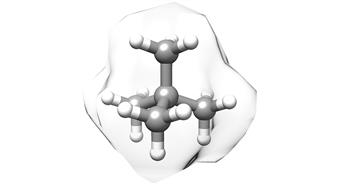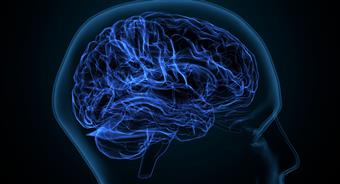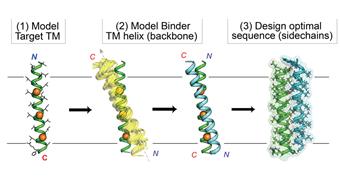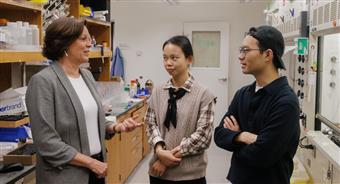
Finding the best screening method for a common heart condition, with the goal of preventing stroke Early detection of atrial fibrillation can help significantly reduce the risk of stroke, and digital health tools may be the answer.
September 30, 2020
LA JOLLA, CA Scientists at Scripps Research Translational Institute have demonstrated a promising new model for using digital health wearables to identify people with atrial fibrillation before they exhibit symptoms.
The screening approach could be expanded to save lives, as atrial fibrillation increases a person's risk of having a stroke by fivefold. If the condition is found early, preventative treatments nearly eliminate that risk.
The study appears in EP Europace, a journal published by the European Heart Rhythm Association of the European Society of Cardiology.
Atrial fibrillation often referred to as afib is the most common heart rhythm problem in the world, affecting more than 6 million adults in the United States alone. Yet too often, the condition goes undetected until after a stroke, says Giorgio Quer, PhD, who led the study.
Patients are traditionally not screened for atrial fibrillation. If they are screened, it's typically done opportunistically, during a visit with a healthcare provider for another reason, by feeling the individual's pulse or taking a 10-second electrocardiogram (ECG) reading. For that reason, roughly 20 percent of people are first identified as having the condition at the time of their stroke. However, modern digital health tools enable much easier and more affordable heart monitoring outside of the clinic.
Screening for atrial fibrillation is possible today using one of many technologies that can accurately measure heart activity, including smartwatches, smartphones, patches, implantable devices and more, says Quer, director of Artificial Intelligence at Scripps Research Translational Institute. In this study, we explored how to use tools like these to best identify people with asymptomatic atrial fibrillation, with the ultimate goal of reducing stroke.
The Scripps Research team previously showed that by monitoring at-risk individuals continuously for several weeks using an ECG patch technology, they found atrial fibrillation among 6.4 percent of the participants, who were asymptomatic.
But since other studies screening for atrial fibrillation have relied on obtaining a 30-second ECG snapshot one or more times a day for several weeks, the new study was designed to create a model to enable researchers and healthcare systems to design better screening programs to more accurately identify individuals who have the condition and are most likely to benefit from preventative treatment.
The team dug into data from their prior studies, looking at the continuous heart monitoring data of nearly 7,000 individuals with intermittent atrial fibrillation. Using this information, they simulated the likelihood of being able to identify atrial fibrillation in an individual by capturing just 30-second ECG recordings several times a day for multiple days, and what the characteristics of the atrial fibrillation (for example, the length of time that people experienced the condition) would likely be present in the individuals identified by that method.
They found that while the intermittent screening approach caught only approximately half of all the people with atrial fibrillation that a continuous patch identified, the individuals it identified as having the condition had a much higher disease burden, meaning they spent a larger percentage of time with irregular heartbeat.
There is still a lot to learn about how to best screen people for atrial fibrillation in a way that will most effectively prevent strokes and all of its complications, including death, says Steven Steinhubl, MD, director of Digital Medicine at Scripps Research Translational Institute. As the digital tools available to physicians and to all people continues to expand, we believe this work empowers providers, systems and individuals to create an early detection program for atrial fibrillation that best meets their needs.
As a next step, Quer said the intermittent screening approach should be tested with different devices and monitoring characteristics, then adopted and validated as part of larger prospective trials.
The study, Screening for Atrial Fibrillation: Predicted Sensitivity of Short, Intermittent ECG Recordings in an Asymptomatic At-Risk Population, is authored by Giorgio Quer and Steven R. Steinhubl of Scripps Research and Ben Freedman of the Heart Research Institute and the Charles Perkins Centre at University of Sydney.
The work was supported in part by the National Center for Advancing Translational Sciences (NCATS), which was established to transform the translational process so that new treatments and cures for disease can be delivered to patients faster.
Heart Disease Quer, Giorgio
More from Scripps
20/04/2024
New copper-catalyzed C-H activation strategy from Scripps Research Two-mode reactions inspired by human detox enzymes offer powerful new tools for drug discover...
12/04/2024
Scripps Research chemists devise easier new method for making a common type of building block for drugs Scientists transform simple linear amines into saturated...
06/04/2024
A simple, inexpensive way to make carbon atoms bind together A Scripps Research team uncovers a cost-effective method for producing quaternary carbon molecules,...
04/04/2024
Developing a vaccine for the zombie drug xylazine Scripps Research chemical biologists design an early proof-of-concept vaccine that could lead to the first...
30/03/2024
How blocking a neural receptor responsible for addiction could reduce alcohol use A Scripps Research team found that a new therapeutic that targets the kappa op...
13/03/2024
New computational strategy boosts the ability of drug designers to target proteins inside the membrane Customized-design approach could streamline the design of...
29/02/2024
Scripps Research scientists reveal how first cells could have formed on Earth New phospholipid discovery brings researchers closer to understanding how primordi...
29/02/2024
How molecular handedness emerged in early biology Scripps Research chemists fill a major gap in origin-of-life theories.
February 28, 2024
LA JOLLA, CA Mole...
22/02/2024
Snaking toward a universal antivenom Scripps Research scientists discovered antibodies that protect against a host of lethal snake venoms.
February 21, 2024
...
06/02/2024
Calibr-Skaggs announces expansion of option and license agreement with AbbVie to develop novel cell therapies for solid tumors and autoimmune diseases
AbbVie...
26/01/2024
Re-energizing mitochondria to treat Alzheimer's disease Scripps Research team restored neuron-to-neuron connections in human cells.
January 25, 2024
LA JO...
24/01/2024
100 years of Science Changing Life: Scripps Research celebrates a century of transforming human health For the last century, institute leaders and renowned scie...
23/01/2024
New technology lets researchers track brain cells' off switches The method could shed light on what goes awry in numerous brain conditions when neurons ar...
09/01/2024
Three decades of giving: Announcing the Calibr-Skaggs Institute for Innovative Medicines The ALSAM Foundation, founded by the Skaggs family, provides lasting g...
04/01/2024
Life science entrepreneur Gene Lay joins Scripps Research Board of Directors Lay, founder of the global biotech company BioLegend, brings invaluable experience ...
21/12/2023
Taming a plant-derived toxin Scripps Research team modifies the traditional poison picrotoxinin for potential neurological drugs and anti-parasite treatments. ...
19/12/2023
Scripps Research Executive Vice President Eric Topol gives TED talk on transformative power of AI in medicine Topol provides an overview of how AI models can i...
13/12/2023
New AI-powered algorithm could better assess people's risk of common heart condition Early detection of atrial fibrillation can reduce the risk of stroke an...
07/12/2023
Nanoparticle flu vaccine design shows promise in early tests Scripps Research-designed vaccine could provide broad, enduring protection against influenza A str...
16/11/2023
Numerous Scripps Research scientists named Highly Cited Researchers Clarivate's annual, global list represents researchers who have demonstrated significant...
07/11/2023
Multiple sclerosis drug invented at Scripps Research slows long-term devastating disease progression Late-breaking data reinforces the effectiveness and safety ...
05/10/2023
Keren Lasker named a 2023 Moore Inventor Fellow The prestigious award will support Lasker's inventive research in membraneless organelles and their applica...
22/09/2023
Michael Bollong named a 2023 Amgen Young Investigator The prestigious award will support Bollong's research identifying new molecular targets and therapeuti...
09/09/2023
Philip Dawson receives 2024 American Chemical Society National Award Dawson is honored with the Arthur C. Cope Late Careers Scholar Award for his foundational c...
07/09/2023
Scripps Research chemists devise a method for C-H activation of alcohols The method represents a new toolkit for making drugs and other compounds.
September 06...
31/08/2023
Scripps Research receives $1.5M to surveil infectious disease threats in wastewater Bill & Melinda Gates Foundation award to support the development of multi-pa...
16/08/2023
How cold temperatures trigger the brain to boost appetite Scripps Research scientists' discovery could lead to new weight loss and metabolic health treatmen...
08/08/2023
Human antibody that targets carfentanil, fentanyl and related opioids reverses overdose effects in preclinical study Scripps Research-developed antibody therapy...
04/08/2023
How sensory neurons impact the gut Scripps Research scientists show that the receptor PIEZO2 in sensory neurons controls gut motility and transit time, which a...
26/07/2023
AbbVie and Calibr Expand Strategic Collaboration to Advance Several Preclinical and Early-stage Clinical Assets The expanded strategic collaboration will advan...
23/07/2023
Scripps Research scientists develop AI-based tracking and early-warning system for viral pandemics Machine-learning system effectively predicts emergence of pro...
19/07/2023
Monitoring T cells may allow prevention of type 1 diabetes Scripps Research study shows that analyzing T cells in blood samples could be used to select at-risk ...
19/07/2023
Scripps Research mourns passing of leading organic chemist Albert Eschenmoser Eschenmoser pioneered key reactions in synthetic chemistry and shaped the understa...
15/06/2023
Scripps Research awarded $46.8 million by NIH to promote human health through innovative translational science and training The Translational Institute is harne...
13/06/2023
Scripps Research's Danielle Grotjahn named 2023 Pew Scholar in the Biomedical Sciences The award will support Grotjahn's study of how cells assemble the...
31/05/2023
Crossing the ring: new method enables C-H activation across saturated carbocycles Scripps Research chemists add another powerful tool to their molecular editin...
24/05/2023
Scripps Research develops behind-the-scenes tool for better biomedical data discovery The new resource makes datasets more discoverable for life science communi...
19/05/2023
Scripps Research neuroscientist Hollis Cline elected to American Academy of Arts and Sciences Cline is recognized for her discoveries about the role of sensory ...
19/05/2023
Scripps Research's Skaggs Graduate School awards doctoral degrees to 31st graduating class Commencement ceremony will be livestreamed via Zoom and on instit...
13/05/2023
A better route to benzocyclobutenes, sought-after building blocks for drugs Scripps Research chemists devise a new, C-H activation-based method for the synthesi...
09/05/2023
Renowned Scripps Research professor Jeffery Kelly elected to National Academy of Sciences Kelly's groundbreaking work on protein misfolding has led to thera...
28/04/2023
Mirror-image molecules pave new path for cancer drug discovery By comparing how mirror image versions of small molecules impact clusters of proteins, Scripps R...
22/04/2023
How alcohol consumption contributes to chronic pain A Scripps Research team showed how both alcohol intake and alcohol withdrawal can lead to increased pain and...
21/04/2023
Xin Jin receives dual awards to study autism risk genes in neurodevelopment Major grants from the National Institutes of Health and California Institute for Reg...
20/04/2023
Trim the sugar: New HIV vaccine design improves immune response Scripps Research vaccine candidate headed for clinical trials.
April 19, 2023
LA JOLLA, CA A...
18/04/2023
Therapeutic can seek and destroy potent opioid to treat overdoses Scripps Research chemists developed a new biologic to work against the synthetic opioid carfen...
07/03/2023
How heavy alcohol consumption increases brain inflammation The findings by a Scripps Research team point toward a potential new drug target for treating alcohol...
02/03/2023
Scientists find human antibodies that can block multiple coronaviruses including SARS-CoV-2 Results from a Scripps Research and UNC team pave the way for a vacc...
28/02/2023
$10 million grant funds Scripps Research Alcohol Research Center through its 50th year The five-year grant supports research into the neurobiology of alcohol us...
28/02/2023
Immune system drug shows promise in treating alcohol use disorder, a Scripps Research clinical trial reports Scientists at Scripps Research found that apremilas...
 Finding the best screening method for a common heart condition, with the goal of preventing stroke Early detection of atrial fibrillation can help significantly reduce the risk of stroke, and digital health tools may be the answer.
Finding the best screening method for a common heart condition, with the goal of preventing stroke Early detection of atrial fibrillation can help significantly reduce the risk of stroke, and digital health tools may be the answer.























